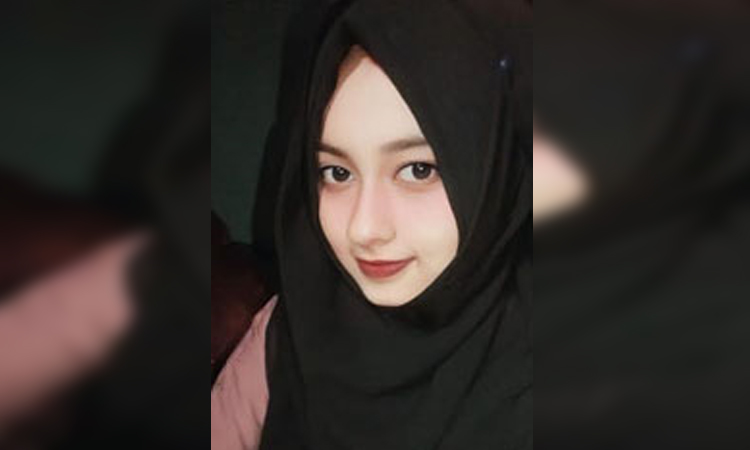
By Rupokur Rahman
SAVAR, May 26, 2025 (BSS) – Nafisa Hossain Marwa, born into a broken home and raised by her grandparents while her mother worked abroad, dreamed of becoming a doctor to heal her fractured world—but that dream was cut short by a bullet on a Savar street, turning her into a symbol of sacrifice in the fight against discrimination.
When 17-year-old Nafisa Hossain Marwa - -an HSC examinee, a sister, a daughter, and now, the first and only female student martyr of the movement from Savar -- whispered her final words to her father over the phone, she was already bleeding from a bullet wound—yet her voice carried the courage of a generation rising against injustice.
On August 5, during the anti-discrimination student movement, a bullet from the forces of repression struck her down in front of Pakija at Savar Bazar Bus Stand. The bullet pierced her chest and exited through her back, ending the journey of a brave young soul.
Nafisa’s journey was shaped by struggle long before her name was carried in protest slogans or written into police reports. Born in Tongi’s Ershadnagar, she was the daughter of a roadside tea seller, Abul Hossain (54), and a migrant domestic worker, Kulsum Begum (44), who had left for Kuwait in a desperate attempt to secure a better life for her daughters.
The marriage fractured under financial strain and separation; relation between the couple eventually ceased. Amidst this disarray, Nafisa became a pillar of strength for her younger sister and extended family.
Since Nafisa’s mother left for Kuwait in search of a better future, conflicts arose between her parents. Eventually, all contact ceased between them. Nafisa and her younger sister, Safa Hossain Raisa (12), lived with their maternal grandparents in Kote Bari, Savar. Nafisa continued her HSC studies at Savar Laboratory College while Safa continued study at class six at Madrasatul Hasnah in Bank Colony, Savar.
Nafisa later moved back to Tongi to live with her father and continue her education at Shahajuddin Sarker School and College. In 2024, she sat for her Higher Secondary Certificate (HSC) exams in the science group, earning a GPA of 4.25—though she would never see the results.
“She was always the brave one,” said her grandmother Amena Begum, speaking through tears. “Even when she was a child, she acted like an adult—always taking care of her sister, always studying, always helping others.”
“Had she lived just a few more days,” said her father, “she would have known how well she had done. But now, all that remains is silence and sorrow.”
Speaking to BSS over the phone, Nafisa’s father Abul Hossain said, “My daughter was very brave and good in her studies. Although I didn’t approve, she was vocal in the quota reform movement from the beginning and would always be on the streets with other students.”
“She left my home on July 27 and went to her uncle Hanif Ali’s house in Dhamrai. After three days, she moved to her younger uncle Hazrat Ali’s home in Kote Bari, Savar, and joined the protests through her old friends,” he added.
“I told her to stay away from protests,” Abul Hossain recalled. “I told her—these fights are not for people like us, we are poor, we sell tea. But she looked me in the eye and said, ‘Baba, until the country is free, I won’t come home.’”
On August 5, 2024, Nafisa left her uncle’s home in Savar to join a ‘March to Dhaka’ programme, a protest that began at Jahangirnagar University and moved toward the capital.
By afternoon, clashes broke out near Savar market. Witnesses said police opened fire to disperse the crowd. One of those bullets pierced Nafisa’s chest, exiting through her back. Despite being critically wounded, she made a final phone call to her father.
“She said, ‘Baba, I’ve been shot. I don’t think I’m going to make it. I’m dying. I’m at Labzone Hospital—please take my body home,’” Abul Hossain recounted, his voice breaking. “I dropped everything and ran. I called her again on the way, but someone else picked up. They said… she is no more.”
From Labzone, she was transferred to Enam Medical College and Hospital, where doctors declared her dead. Her uncle Hazrat Ali, who had tried in vain to dissuade her from joining the protest that morning, retrieved her body.
Her 12-year-old sister, Safa, could barely speak to the reporter. “She used to hug me, scold me, then laugh the next moment,” she said. “She was everything to me. Where do I find a sister like her again?”
Talking to BSS, family members described Nafisa as disciplined, passionate, and fiercely independent. Her mother Kulsum Begum, devastated by the news, returned from Kuwait within a month of her daughter’s death.
“She wanted to help me,” said Kulsum, clutching Nafisa’s old notebooks and photographs. “She used to say, ‘Amma, one day I’ll stand beside you, we’ll fix everything.’ But now… now I only have her memories.”
“She was not just our daughter,” said her grandfather Imon Ali (70). “She was the nation’s daughter.”
Imon Ali added, “Nafisa was strong-willed and courageous from childhood. She always did what she set her mind to. I warned her not to join the protests, but she wouldn’t listen. On August 4, she and her friends marched to Jahangirnagar University and then back to Savar. That night, she told me she wants to join the road march to Dhaka on August 5. I tried to stop her, but she insisted.”
A murder case was filed with Savar Model Police Station by Abul Hossain.